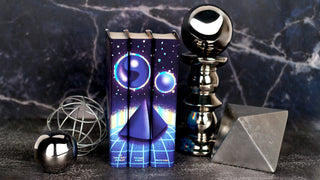Science fiction encourages us to take a peek into the future and reflect on how our choices affect the world around us. Whether it’s space travel, alien invasions, destructive AI, or the aftermath of a world-ending apocalypse, sci-fi captivates readers with its thought-provoking themes. When it comes to translating these otherworldly novels into movies and television series, sci-fi books stand out as some of the best inspirations for on-screen adaptations. Dune, The Expanse, The Handmaid's Tale, and even the new television series based on the Three-Body Problem trilogy are all amazing examples of movies and shows adapted from sci-fi novels. Here’s why we think sci-fi book adaptations rarely ever miss the mark.
Visual Storytelling
Similar to fantasy authors, sci-fi writers are masters of visual storytelling. While fantasy writers paint a picture in the readers’ minds of a magical world that doesn’t exist, sci-fi writers must create a future version of the world that we all live in. This delicate balance between fact and fiction is the mark of a great sci-fi novel. The visual storytelling of authors like Frank Herbert, Margaret Atwood, and Liu Cixin provides the perfect springboard for screenplay writers, directors, and special effect artists to create stunning, award winning motion pictures. The time and care that novelists take to craft their futuristic worlds is often tenfold what can actually fit in a screenplay, and this excess of information is what makes sci-fi adaptations so perfectly rendered for the big screen.
The Dune Series by Frank Herbert is a perfect example of masterful visual storytelling. In large part due to Frank Herbert’s literary world building, the Dune movie won awards like the Academy Award for Best Visual Effects, the Academy Award for Best Cinematography, and the Academy Award for Best Production Design.
Exploration of Real World Ideas
Sci-fi novels almost always hold a mirror up to society and the ethical issues we face in the present day. Pollution, overpopulation, disease, technological advances, and political issues are all prominent themes in sci-fi novels. Science fiction authors often take current day issues and imagine what they will become in the future. With such relevancy to the human experience, sci-fi novels are well set up to become box office hits. While it may be uncomfortable to look at the future repercussions of our actions, sci-fi movies are intoxicating for audiences. Just like the metaphor of not being able to look away from a train crash, sci-fi movies reflect humanity’s very own train crash that we cannot look away from.
Liu Cixin’s trilogy titled The Three-Body Problem explores countless real world ideas. Tackling events during China’s Cultural Revolution as well as China in the early 2000s, Cixin bases every event in his books off of real world events and scientific facts. This basis in reality makes his futuristic predictions even more eerie and intriguing, because in many ways his story could be an accurate representation of what our future will look like. Television adaptations like the 3 Body Problem on Netflix are not only great for entertainment, but also for sparking important conversations on social media about ethics and the future we must fight for.
Whether you’re new to science fiction or a loyal fan of the genre, we highly recommend reading sci-fi books that have film counterparts. There’s a great chance these books were chosen to be adapted onto the big screen because of the author’s masterful world building and impactful themes. The realm of science fiction is truly boundless, and there’s nothing like getting lost in the pages of these iconic sci-fi novels.




